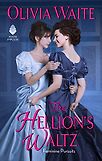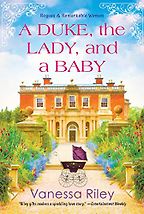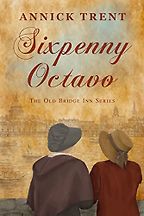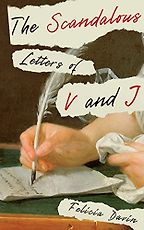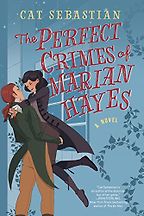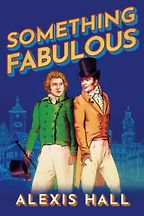Over the past couple of years, there seems to have been a resurgence in the historical romance genre, especially with books focusing on Britain’s Regency period, from 1811 to 1820. Do you think that their popularity is a byproduct of the success of Julia Quinn’s Bridgerton series?
I think that they’re definitely connected. A lot of people found something that they loved in the Bridgerton series. The first Bridgerton book was published in 2000, but I think that when people saw an adaptation that was fun, nimble, young, and less restrained, it brought up a new conversational space in the romance community. There had been a push for making the historical romance space more inclusive for and by people of color. Bridgerton gave a lot of people the excuse to do something about it, to say: aha, a new market! If you like this multicultural television show, then maybe you’ll enjoy these multicultural romance books as well.
I think that some of that was opportunism. Some of it was a necessary correction to the markets’ over-saturation of whiteness and straightness and it’s a direction that I’m very glad to see the genre go in. I really hope that we can sustain the momentum.
As a queer historical romance writer yourself, do you find that over the years, this genre has become more diverse and more accessible to other marginalized readers and creators, such as the LGBTQ+ community and people of color?
I want to say yes, that the genre is getting better, but if you look into the history, you find that these things go in cycles.
Back in the 1970s, Avon was putting out what we would now call gay romances, like Vincent Virga’s Gaywyck, but it was very much in that seventies pulp fiction vein. There wasn’t that HEA—’happily ever after’—pressure that the romance genre has nowadays, but I don’t want to go on a side tangent about that.
What you do realize though is that a lot of this history has been forgotten or neglected. People have always been writing queer romances and romances with people of color. Beverly Jenkins has a wonderful speech about the history of Black romance in America. It’s just a question of how every generation has to rediscover those books because there are all these forces trying to keep it quiet, whether it’s out of malice or neglect. It is something that I feel like we have to rediscover and push back on and celebrate. Luckily, it’s really fun to celebrate it, so that helps!
I am glad to see more publishers coming out with more inclusive and queer romances though. I’m glad to see Adriana Herrera and Lydia San Andres. We’ve got a new one coming out called Ana María and The Fox by Liana De la Rosa, which is a Latina historical romance that’s just about to debut. There are so many authors of color that are exploring worlds outside of the British Regency period as well. There’s just so much more ground to cover!
Let’s talk about the first Regency romance novel that you chose for us: The Duke, the Lady, and a Baby by Vanessa Riley. What made you fall in love with this title?
First, I have to say that it has this beautiful, adorable cover, but please ignore it. The book is much less comedic than the cover implies. In the book, the heroine is in disguise and her baby is in the custody of this duke, who lost his leg in Waterloo, so he’s very grumpy and sinister. There’s also a sinister murder plot happening in this house with a very big chandelier. It’s very gothic and atmospheric. It’s so great but it’s just the romantic comedy that the cover makes it seem like. It’s actually the first in a series.
Vanessa Riley always has this tone that strikes me as classically historical. There was a review where I wrote that when you read her books, you feel the drape of lace on a sleeve. It’s just so atmospheric. It can actually be quite surprising. It’s really wonderful, and while I haven’t had time to dig into the rest of that series, she’s just incredible at setting a mood.
Your second book recommendation is Annick Trent’s Sixpenny Octavo. Can you tell us what about this book caught your eye, and why we should all run out and grab a copy immediately?
Well, it’s a sapphic Regency romance, so it’s about two women, but more importantly, it’s two lower-class women. There is an increasing number of authors that are doing non-titled characters in historical romances, expanding the history that way. Sixpenny Octavo is the story of a clock mender and a housemaid-turned-dancing master’s assistant. They meet in the context of helping to get a mutual friend out of prison because she’s been charged with sedition on the account of the reading club that she and the clock mender is in. The housemaid will in turn testify to get the clock mender’s friend released from prison. In the course of dealing with the prison system, reading club stuff, and the housemaid finding a new job, the housemaid and the clock mender fall in love. However, there might be an informant in the reading club, so they have a traitor in the midst.
The thing that I love about this book is that yes, there are the sedition charges, and the prison element, and it’s frightening and real, in a way that we don’t often see in historical romance novels, but at the same time, this book is so cozy and warm. It’s about friends who get together in a pub and read aloud to one another. It’s so interesting and fascinating and richly detailed. There’s so much history in the Regency that we don’t usually get to see. With Bridgerton, even when they’re doing the big social scenes, it still keeps it socially focused. It’s very domestic, and while that’s great, there’s so much more happening in this time period. Getting out of this aristocratic mode really opens up the possibilities of the world.
It reminds me of Spring Flowering by Farah Mendlesohn, another working-class lesbian Regency romance.
The third recommendation that you have for us is The Scandalous Letters of V and J by Felicia Davin. What about this Regency romance novel appealed to you?
This one’s a bit of a risk because it’s not done yet. Actually, it is, but I’m not done with it yet. This book comes out in May, but she’s releasing for free in serial installments; if you sign up for her emails, she’s sending out a letter a day until the book comes out. The letters are so beautiful. It’s Regency era, but it’s set in France, around 1823. It’s very steamy, very queer, and it’s just delightful.
So far, we’ve met V. They’ve been kicked out of their house by their brother and father who are both terrible people, so they’re staying with their aunt in a boarding house wondering what the next stage of their lives is going to look like. I’m just really excited about this one. The book is very experimental and unique, and I’ve read enough of Felicia Davin’s writing to go, ‘Yes! I’m just going to dive in! Let’s go!’ She’s an auto-buy author for me for sure.
The fourth book on your list of favorite Regency romance novels is The Perfect Crimes of Marian Hayes by Cat Sebastian. Tell us about it.
Technically this one is Georgian—an earlier period that ran from 1714 to 1837—but for all intents and purposes it falls under Regency in the marketing aspect. Cat Sebastian’s books are constantly reaching out of the usual boxes of historical romances. They’re doing something new, they’re doing something edgy.
The subtitle of this one is basically: ‘Be gay, do crimes.’ It’s about a duchess named Marian Hayes, who may or may not have murdered her husband; she’s not entirely sure. She ends up going on a road trip to go into hiding while she waits for all of this mess to blow over, and she goes with the man who has been blackmailing her. They’re both bisexual, and it’s one of those great queer M/F romances that I love so much. It’s about the takedown of the aristocracy as two people try to find a life outside of the past that has held them back. They’re very grumpy and the banter is exquisite. It’s a little murdery and it’s just so much fun. If you’ve ever had fun getting angry about something, then this book is like that, because when you’re finally no longer mad, you feel even better.
Marian and her blackmailer pretend to be married while they’re hiding and staying at this tiny inn, and of course there’s only one bed. They don’t really like each other entirely yet but they do find each other attractive. It’s a wonderful bit of chaos. I will say that you might want to read the first book in the series before this one, which is called The Queer Principles of Kitt Webb, but I do think that these books stand well enough on their own. Cat’s currently also writing some romances that will take place in the 1950s, both in the US and in the UK. I’m loving them so I’m hoping that we open the genre up more geographically and time period-wise because there’s so much fun stuff that you could put in a historical romance.
Finally, your fifth book: Something Fabulous by Alexis Hall. Pretend that I’m a customer in a bookstore. How would you go about recommending this title to me without knowing if I was a fan of the genre or not?
I would cheat and ask if you’ve read any romances or what else you like to read! I’m a former bookseller, so I believe in tailoring recommendations to the person. The thing about Something Fabulous is that if you’ve ever read a Georgette Heyer book, then this would be the romance for you. It’s a classic Regency romp, but it’s extremely, extremely queer.
There’s shenanigans, hijinks, a road trip. It basically takes that sinister, controlling, demanding duke who says, ‘Young woman, you will marry me,’ then completely unravels it in a very fun and queer kind of way. Rather than the Duke having all of this power, he loses it sort of step by step, and also begins to learn more about himself as a person. He realizes that he’s demisexual—of course, they don’t use that language in that time period, but it’s clear about what’s happening. He falls in love with his fiancé’s twin brother, who is a rolling ball of chaos. It’s fantastic! There’s family drama, dueling. It’s handled in a very tongue-in-cheek kind of way, and if you’ve ever read any Alexis Hall, you know how funny his books can be.
The secondhand embarrassment did almost kill me at some parts, but it was really fun to see classic tropes broken down and played with in a way that I haven’t seen before. Alexis did write a very different kind of book, A Lady for a Duke, which is a Regency title with a trans heroine, but that one is a big ball of feelings. It’s a big pining, angsty, ‘they can never know my secret’ kind of romance, while Something Fabulous is more ‘Whoopsy, the Duke gets menaced by a bee!’ They’re very different, but both are wonderful.
Thank you for these delightful recommendations! I’ve noticed that 2023 looks like it’s shaping up to be another great year for historical romance novels. What are some titles that you’re eagerly anticipating yourself?
Ooh, well, we’ve got Freya Marske’s third book, the end of her trilogy, which is coming out soon. It’s called A Power Unbound. There’s Diana Biller’s Hotel of Secrets, which I’m starting and it comes out in March. Also, Felicia Grossman has another one coming out this year! She writes American historicals with Jewish protagonists, and her first two books—Appetites & Vices and Dalliances & Devotion—were spectacular. Her next book, Marry Me by Midnight, is the first in a series of fairytale retellings that will be set in the London Jewish Community during the Regency period.
I’ve been reading quite a lot of historical romances and fantasies, that’s been my jam this year. There’s a new book in Erica Ridley’s Wild Wynchesters series that’s coming out later this year called My Rogue to Ruin. And from Harlequin Historical, Lydia San Andres is set to release Alliance with His Stolen Heiress, and she writes Caribbean-set Hispanic historical romances that are just plain lovely. She has a whole series set on a fictional Caribbean island and it’s all linen, and lagoons, and guava jam, and suffragettes. I’m like, ‘Yes, yes, to all of it!’
It’s already been a really good year for historicals, and I’m glad to see that people are branching out more. I also want to recommend Adriana Herrera because she had A Caribbean Heiress in Paris come out last year and the newest book in the series, An Island Princess Starts a Scandal, is out in May. Oh, and I can’t forget The Davenports by Krystal Marquis! The cover is just beautiful. I’ve been saving it and I am really looking forward to diving in.
Five Books aims to keep its book recommendations and interviews up to date. If you are the interviewee and would like to update your choice of books (or even just what you say about them) please email us at [email protected]
Five Books interviews are expensive to produce. If you've enjoyed this interview, please support us by donating a small amount.

